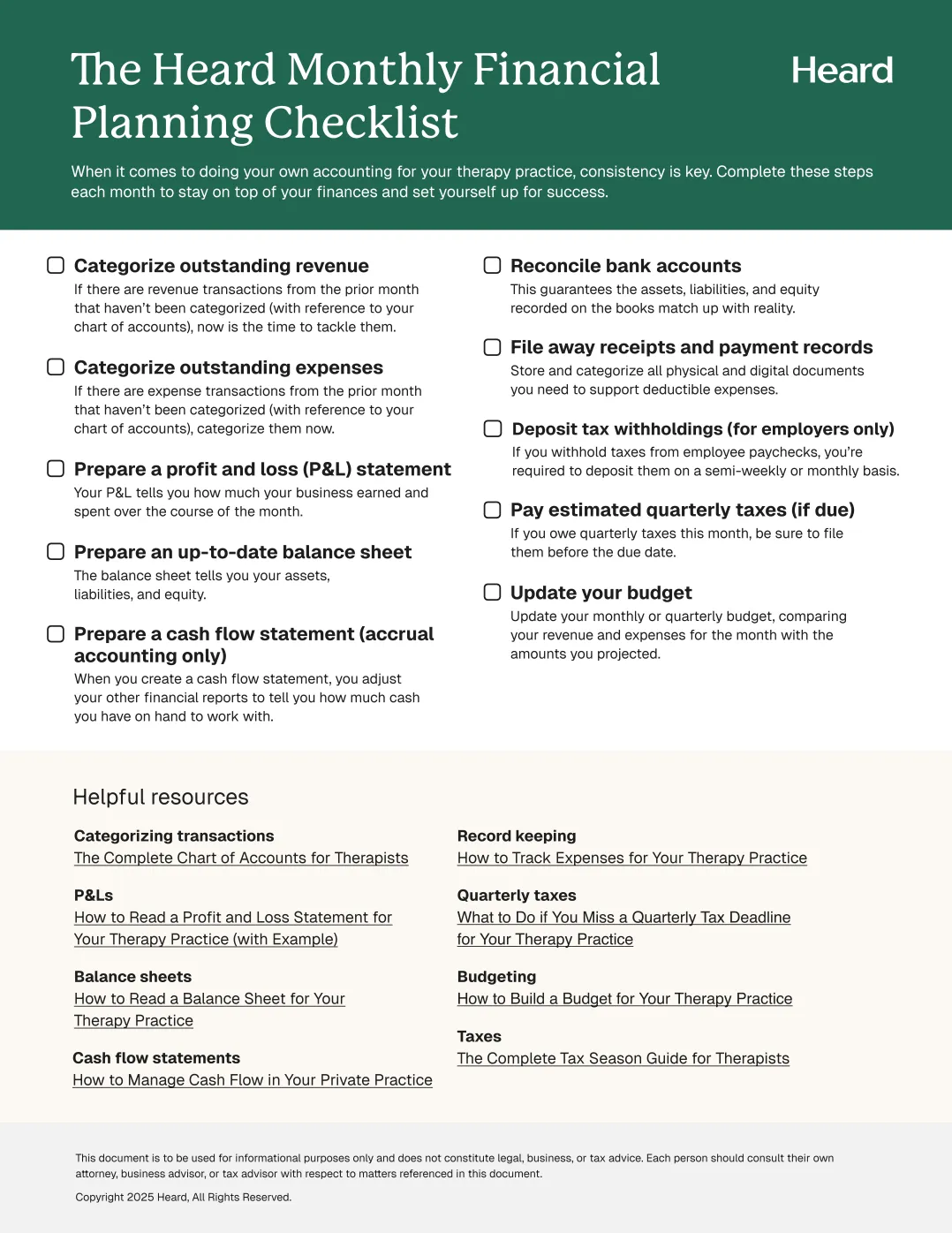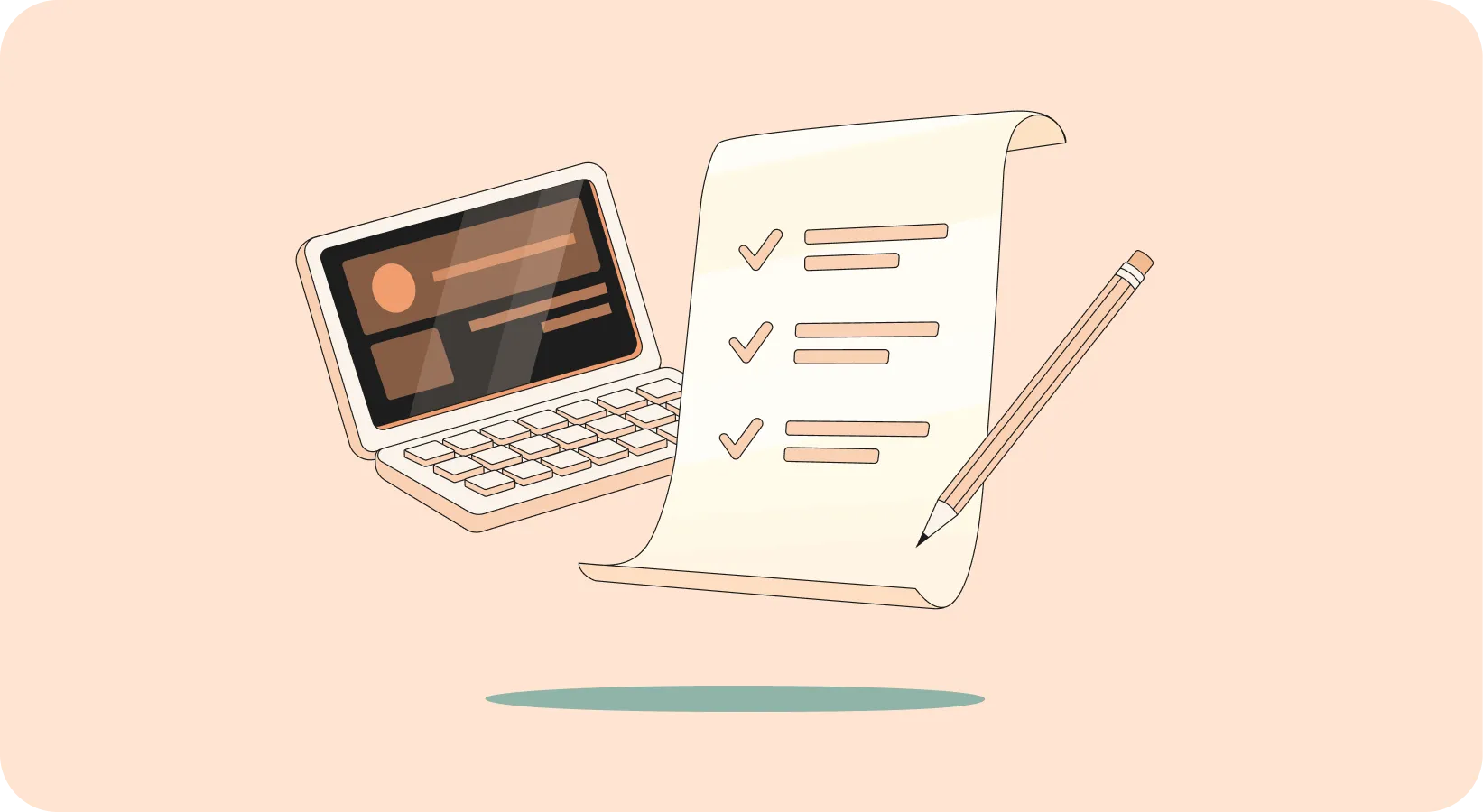There are a number of ways for therapists to prepare for a recession, none of which involve buying gold bars or stockpiling canned goods.
Yes, a recession could have serious impacts on your therapy practice—and most other businesses, too. It could mean lowered income, more difficulty obtaining credit, and general economic stagnation. But it’s no reason to panic.
A recession isn’t the end of the world. It’s part of the capitalist economic cycle. If you’re going to enjoy the benefits of boom times—when unemployment is low, disposable income is high, and gaggles of new clients are knocking down your door—you also need to be ready to weather the economic busts.
This article will help you do that. We’ll explain seven tactics you can start using right away to prepare your therapy practice for a recession. But first, let’s cut through the hype. What is a recession, really? And what can you expect when one hits?
{{resource}}
What is a recession?
Technically, a recession occurs when Gross Domestic Product (GDP) drops for two quarters in a row. So, that’s a minimum of six bad months for the economy.
GDP is a measure of money changing hands. The higher the GDP, the more money is circulating in the economy. When GDP drops, it means people and businesses are spending less money—and earning less, too.
According to the National Bureau of Economic Research, since 1954, the US economy has weathered 33 recessions. That’s an average of one recession every five years. Naturally, however, recessions don’t follow a set schedule.
Perhaps you’re asking, “What about the Panic of 1837?” or “What about the 1973 oil crisis?” True recession heads can get their fix from this comprehensive list of American recessions.
What happens during a recession?
Recessions are an innate feature of an economy that runs on supply and demand. Broadly speaking, when demand outstrips supply, the economy expands. When supply outstrips demand, it contracts. A recession is the contraction part of the economic cycle.
During this contraction, spending decreases overall. Household budgets get tighter. For a therapy practice, that’s likely to mean fewer potential clients decide to start going to therapy. In Maslow’s hierarchy, food and shelter come first. When people are having trouble paying for necessities, they are less likely to pay for items lower on the list. For most people, this includes therapy. Similarly, as budgets tighten, existing clients may no longer be able to afford therapy sessions, especially if they’re paying out-of-pocket.
Each recession is different. Some economists describe them using letters. For instance, a “V” recession is one that consists of a sudden, severe dip in the economy, followed quickly by recovery. A “W” recession sees a sudden dip, some recovery, then another dip. It’s impossible to say which will come next.
What causes a recession?
Explaining a recession in terms of supply and demand is an extremely simplified approach. A number of factors contribute to a recession, including:
- Disasters. The outbreak of COVID-19 in early 2020 resulted in the loss of 22 million jobs. It was the shortest and most severe crisis ever experienced in the USA.
- An overheated economy. When demand outstrips supply, spending eventually slows down, and the pendulum swings the other way.
- Asset bubbles. The dot-com bust of 2001 and the housing market collapse of 2008 are both examples of asset bubbles popping.
Investors and financial advisors look out for indirect signs a recession could be on the way. These include:
- Rising interest rates
- Decreased home sales and costs
- Credit crunches
- Deflation
- Reduced manufacturing orders
- Bear markets
Don’t lose sleep trying to predict a recession, though. The world’s most experienced financial experts have trouble doing so with much accuracy. Your time and energy are better spent preparing your therapy practice in case a recession hits.
How long will a recession impact your therapy practice?
Typically, a recession doesn’t last longer than a year. That being said, the impacts of a recession can stretch beyond the limits of when it technically begins and ends. Recovery from a recession may be slow for some industries, faster for others. And a severe recession can send out ripples felt for years to come.
The important takeaway here: when economic experts talk about an imminent recession, they’re not talking about a five year slump, or a ten year slump, or a complete collapse of the economy. It’s a measurable phenomenon, and while it may feel long—ask anyone who weathered the 2008 recession—there is almost always a light at the end of the tunnel.
{{resource}}
How to prepare your therapy practice for a recession
Financial experts, investment gurus, and your uncle who spends too much time on Facebook agree: there’s a recession on the way. So, what can you do to prepare your therapy practice?
Exact strategies vary according to the specifics of your business, and your accountant should have insights into what you can do to recession-proof your therapy practice. But here are seven steps you can take right away to start preparing for a recession before it hits.
Prioritize paying off debt ASAP
If your therapy practice owes money, the best thing you can do is pay it off as soon as possible. Then, avoid taking on any more debt.
It will help you avoid two major pains that businesses struggle with during recessions:
- Reduced cash flow. Scheduled monthly payments for lines of credit, loans, and back taxes eat into the cash you have on hand, making it harder to cover expenses each month. Paying a little extra now, when you can afford it, can help reduce the drain on your cash flow later, when you really need the money.
- Maxed out credit. If there’s barely any room left on your business credit card for spending, you’re in a tight position in the event an emergency rears its head. Having credit available can be a life-saver in case of sudden shortfalls. If you can pay down your credit card now, you free up credit you can use later in case of emergencies.
Avoid taking on new debt now that you’ll have to repay in the short term, or which will require monthly payments.
Thinking of moving to a bigger office, or hiring someone to redesign your website? Unless they’re absolutely necessary, it’s better to hold off on major investments in your therapy practice until the recession has come and passed.
Get access to credit while it’s available
With a recession approaching, it’s unwise to take on debt. The same doesn’t apply to credit.
Having more money available to borrow helps you recession-proof your practice by preparing for shortfalls. Opening a new line of credit, applying to have the limit raised on your credit card, or getting a second credit card for your business are all ways of giving yourself breathing room in case of a recession.
If interest rates are set to rise, you may be able to lock in a lower interest rate on a business line of credit now.
Plus, in the event your income destabilizes or decreases during a recession, it may be harder to qualify for more credit at a decent interest rate. The best time for your practice to get access to more credit is when your balance sheet and cash flow are looking good, and the bank is happy to give it to you.
No business wants to rely on their credit card to cover rent payments. But the loss of income that could result from a recession has the potential to significantly disrupt your cash flow. You may have no choice but to borrow money in order to cover your overhead, at least until cash flow stabilizes. In that case, it’s better having credit available than to have to credit at all.
Shorten your billing cycle
You need to be prepared for cash flow squeezes in the future, and that means making sure you get the money you’re owed ASAP.
If you have clients paying on a monthly schedule, see if they’re able to switch to weekly or per-session payments. If you invoice a vendor for contract work—facilitating group therapy sessions, for instance—talk to them and see if you can shorten the payment cycle. Switching from net 60 to net 30 could significantly increase your cash flow, and ensure you have cash on hand to cover expenses when it really matters.
Review your regular expenses
It’s a good idea to review your regular expenses on a quarterly or annual basis. If you’re preparing for a recession, start doing it monthly.
You have two goals:
- Eliminate unnecessary expenses: At some point, most individuals have to weed out expenses on their credit card or bank statements. The gym membership you never use, the streaming service you never watch, the magazine subscription that auto-renews—they have a way of sneaking up on us. Businesses face the same problem. Maybe you signed up for a calendar app you thought would change your life, quit using it after one week, and never canceled the subscription. Maybe you’re still receiving issues of a psychology journal you never read. These expenses may seem small, but they add up. Set aside time to eliminate them now, and you’ll free up more room in your budget.
- Reduce the expenses you can’t eliminate: It could be as small as remembering to turn off the lights when you leave your office. Or it could be as big as transitioning to 100% remote sessions, and moving out of your office space as soon as your lease expires. Finding clever ways to reduce your expenses now will pay off in the long term, as your cash flow increases and you divert that extra money to a savings account.
Explore new revenue streams
Having additional revenue streams doesn’t only result in more revenue for your therapy practice. It also helps you adapt to circumstances in case you start losing clients due to a recession.
These revenue streams could include:
- Online courses, either solo or through an institution or business
- Ebooks, self-published or written for a publisher
- Content writing for businesses that serve therapists
- Group sessions at institutions
- Workshops at community centers, schools, or businesses
Maybe you’ve considered one of these before, but didn’t feel like you had the time and energy to pursue it. Or maybe you’ve been so focused on building your client list that you haven’t had time to explore other options yet.
Now is the time to explore additional sources of revenue. Even if overall demand for one-on-one therapy decreases during a recession, other products or services may see no dip in demand at all. They could be the revenue sources that keep your business going through lean times.
Focus on long-term clientele
A small shift in the types of clientele you focus on could reinforce your cash flow against the threat of a recession.
For instance, if you’ve mostly been focused on providing short courses of CBT treatment for depression and anxiety, you’re used to clients coming for you for a certain number of sessions and then leaving. At the same time, you may have clients coming to you for longer-term treatment, whom you see week after week, month after month.
The non-CBT clients seeking longer-term treatment will be your most valuable assets in the event of a recession, because they guarantee regular recurring revenue for your practice. If you’re willing to do so, taking on new clients who need long-term care, rather than courses of treatment with a specific, finite length, could be better for your practice’s finances.
This may be a difficult decision to make—it could mean turning away some clients seeking treatment, and prioritizing others. It may seem cold and calculating. But the best thing you can do for your current clients, and for any future clients who need your help, is to stay in business. With a recession on the horizon, that may mean making some tough choices.
Invest in good bookkeeping and accounting
You’re only able to track your revenue and expenses if your books are accurate and up to date. Regular financial statements show you how much you’re spending and earning, and allow you to make projections for the future. And categorizing transactions ensures you won’t lose track of any deductible expenses that could lower your tax bill.
Whether the economy is going through a boom or a bust, one of the smartest investments you can make for your therapy practice is to hire a qualified bookkeeper and accountant. You’ll get insight into your business to help you weather any storm ahead—and a professional on your side in case you need advice or guidance.
—
Solid financial statements are the key to monitoring how your therapy practice performs. If you’re new to financial statements, or you’ve never read one before, get started with our guide to profit and loss statements for therapists.
This post is to be used for informational purposes only and does not constitute legal, business, or tax advice. Each person should consult their own attorney, business advisor, or tax advisor with respect to matters referenced in this post.
Bryce Warnes is a West Coast writer specializing in small business finances.
{{cta}}
Manage your bookkeeping, taxes, and payroll—all in one place.

Discover more. Get our newsletter.
Get free articles, guides, and tools developed by our experts to help you understand and manage your private practice finances.





